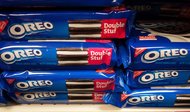After 12 years as Tribeca’s presenting sponsor, American Express is stepping back, while ATT steps in, as the primary supporter of a movie conclave that was originally meant to lift a battered downtown following the 9/11 terrorist attacks.
Jane Rosenthal, who founded the festival with her husband, Craig M. Hatkoff, and with Robert De Niro, her business partner, said the change reflected the evolving strategy of all involved.
“Everybody always shifts their priorities and business plans every 12 years or so,” said Ms. Rosenthal, who spoke by telephone last week.
In 2011, Ms. Rosenthal noted, ATT became the sponsor of the Tribeca Film Institute’s youth screening program. This year, the company joined other sponsors in supporting the festival, which has become more digitally oriented with events like an annual hackathon, which prompts participants to solve storytelling problems and other challenges with tools like their smartphones.
Pointing to ATT’s previous promotional efforts in New York — including free Wi-Fi coverage in many parks, and solar charging stations around the city — Cathy M. Coughlin, the company’s senior executive vice president and global marketing officer, said the festival was another way to connect with things “that are important to New Yorkers, not only the tourists and visitors.”
The company, she said, expects to create a mobile app to track festival news and events. It will also host a day of free public screenings, something that has not been done in the past at Tribeca.
Caitlin Lowie, a spokeswoman for American Express, declined last week to discuss her company’s decision to reduce its role at the festival, of which it will now be one of about 60 sponsors at various levels. Other sponsors have included Bombay Sapphire, Hilton Hotels and Resorts, and PepsiCo.
In a statement sent by e-mail last week, Ms. Lowie said American Express would continue to provide its cardholders with early access to tickets, and expects to remain involved with Tribeca in some capacity for “years to come.”
But ATT, Ms. Rosenthal said, will assume the presenting sponsor’s role under a multiyear contract. She and ATT executives declined to disclose terms.
The partnership with a communications company, she added, seemed natural when so many filmgoers — including the 117,000 or so who pass through the Tribeca festival to see about 100 feature films annually — use digital devices to make themselves a part of the show.
“Audiences have never had more control than they do now,” Ms. Rosenthal said.

